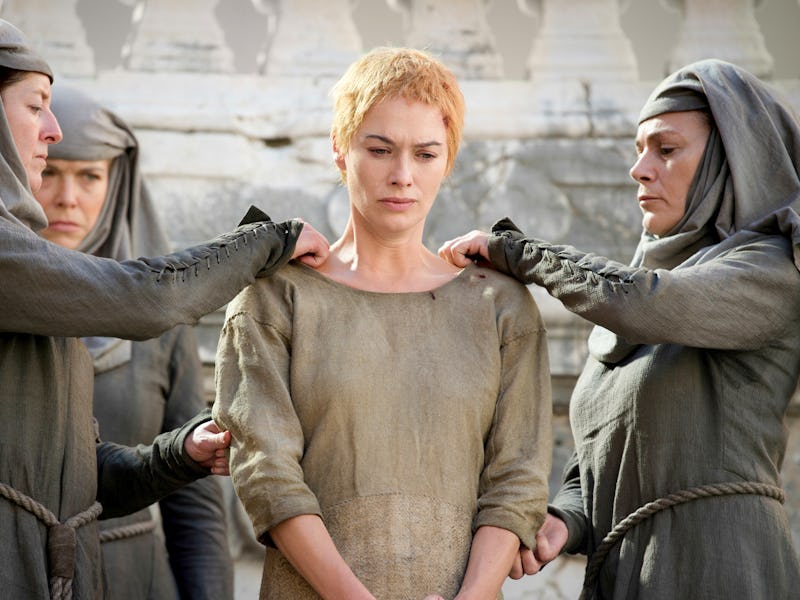'Game of Thrones' Created TV's Greatest Female Anti-Hero in Cersei Lannister
Cersei Lannister is a bitch. She's also an example of the paradox of 'Game of Thrones' and what TV writers can learn.

Game of Thrones’s Cersei Lannister is a bitch. She’s vengeful, manipulative, cruel, and has no sympathy for the less fortunate — even if they’re in her own family. She rejects her brother Tyrion for his “monstrosity” and when the brother she loves returns with a disabled sword-hand, she temporarily rejects him, too. As Tyrion once told her, “You love your children. It’s your one redeeming quality. That, and your cheekbones.” But terrible as she is — as few redeeming qualities as she has — she’s always interesting to watch. Always. Being unlikable, yet still engaging, is a quality male antiheroes often possess — Walter White, Don Draper, James Flint, and even Jaime Lannister — but it’s exceedingly rare in their female counterparts.
Breaking Bad’s Skyler White is a drag, True Detectives’s Ani Bezzerides’s every line sounds like a man wrote it for her, True Blood’s Sookie Stackhouse is a wishy-washy annoyance, Orange is The New Black’s Piper Chapman is tiresomely narcissistic, Vikings’s Aslaug is a cartoon shrew, and even Buffy The Vampire Slayer’s Buffy is the show’s least engaging character, often abrasive and off-putting.
Inevitably in any fandom debates, when you state your dislike for a female character, you’ll be met with sentiments of “you don’t like her because you’re a misogynist! You’d like her if she was a man!” (See: when Black Sails fans discuss Eleanor Guthrie).
And while this is certainly true sometimes, given that we do have ingrained double-standards about female likability, it’s often a far simpler matter on TV. Most female antiheroes are not as engaging as their male counterparts because they’re not as well written.
There’s an obvious reason for this: Television writers’ rooms are overwhelmingly male and in most of their attempts to write female antiheroes or Strong Female Characters, it shows. How many times have you heard a female character say a line that takes you out of a scene because no human woman would ever actually say that?
Male antiheroes can do terrible things — deal meth, cheat on their partners, snort metric tons in coke — while still remaining an interesting watch. Even in his prime douche days, Jaime Lannister was fascinatingly complicated, contradictory and fucked up. He was never less than fully-fleshed out, because the writing never lost his humanity.
Though this is much rarer in reverse, Cersei Lannister is the greatest exception. It’s partly because of Lena Headey’s magnificent performance, which was never stronger than at the end of Season 5.
In spite of all the horrible things we’ve watched Cersei do — most egregiously, enabling Joffrey’s cruelty — Headey managed to make us pity her during that Walk of Shame. With her facial expression alone, she brought us into an extremely unsympathetic character’s humiliation and pain — and it was affecting. We still didn’t like her, but we felt for her the same way we felt for her brother and countless television antiheroes.
But Cersei stands alone among female antiheroes for another reason. Game of Thrones has a bizarre paradox that keeps intelligent viewers coming back in spite of lines like “You want a good girl but you need the bad pussy.” Yes,GoT is unable to depict a world that has uneven gender politics without constructing the show itself that way— failing to get when an audience will interpret a scene as rape (Jaime and Cersei in Season 4) or failing to get what the focus of a rape scene should be (Sansa and the camera panning to Theon in Season 5). But Game of Thrones is in TV’s top 1% in depicting nuanced female characters.
It’s an incredibly weird, how tone-deaf the show is in some areas (how did nobody in production watch the Jaime Cersei Season 4 scene and say, “you know, 100% of the audience will see this as rape…if that’s not what we intend, maybe we should edit it!”) and how enlightened in other areas. When Cersei is onscreen, no matter what horrible things she says or does, you don’t want to take a snack or bathroom break. You’re riveted.
You can’t say the same of most other female antiheroes, because they don’t have inner lives and clear motivations the way Cersei does. They come off as shrill and abrasive not because “that’s just the way women are!” but because the writers forget to give them other qualities. Or they omit the convincing reasons for these qualities. And sure, you can’t ignore the double-standard about women being “likable,” you can’t ignore the fact that “shrill” and “abrasive” are not adjectives typically attributed to male characters. But at its core, this is a writing issue.
Game of Thrones does not have perfect writing (hello, Sand Snakes) and unquestionably, has blind spots around gender politics. But the conversation around its sexism continues endlessly because of its intriguing contradictory nature. There will always be merit to both sides of the argument — Game of Thrones exploits women; no it’s actually feminist! — because more than any other show, it embodies both.
Cersei Lannister exemplifies why Game of Thrones is one of the most fascinating and debate-worthy shows on TV, even six seasons deep. If and when she finally meets her end — perhaps in Season 6, perhaps later down the line — it’s guaranteed that the scene will elicit far more emotion than it’s got any right to. Cersei is unpleasant, Cersei is terrible, Cersei should not be anyone’s model for behavior. But she stands as a sign for how to get a female antihero right.